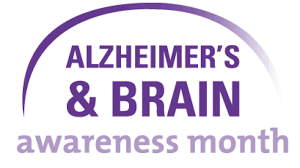So many people know of someone touched by brain disease that this month’s designation as Alzheimer’s and Brain Awareness Month is especially relevant.
Dementia and Alzheimer’s, a severe form of dementia, are devastating brain diseases that impact families across the world. As people live longer, the prevalence of brain diseases increases because the risk of developing dementia and similar diseases rises with advancing age.
Your career as a nurse means you can have a direct impact in your personal and professional life on the ravages of this disease. As a nurse, you can learn more about how patients with Alzheimer’s might react in unfamiliar situations (like a health care facility or hospital) so you can offer them even more effective care. You can also learn more about the signs and symptoms to help people who might be concerned about loved ones’ behavior or lapses in their own memory. You can also ease fear by debunking some of the common myths of Alzheimer’s (like that Alzheimer’s is only something elderly people get).
In your personal life, your authority as a nurse can help others in your life who might come to you privately with concerns. You can offer the reassurance and guidance that comes from learning more about brain diseases.
According to the Alzheimer’s Association, these are a few warning signs to notice:
- Memory lapses that disrupt daily life
Lots of people forget where they put the car keys. It’s troublesome if they can’t remember what the keys are for.
- Trouble completing normal tasks
It’s normal to forget how to get to the restaurant you only go to once a year. Getting lost while heading to the regular supermarket should be a red flag.
- Distinct mood changes
Getting a little grouchy at the end of a long day with family is okay. A sharp, noticeable change in normal mood is something to pay attention to.
- Confusion about time and place
In your office, a patient might not remember they are due for a tetanus shot. A patient who can’t tell you why they are in your office is showing warning signs.
As a medical professional, you always focus on prevention, but there is no proven treatment to prevent Alzheimer’s. However, it’s never too late to encourage activities that are good for overall brain health including a healthy diet rich in antioxidants, exercise, social interaction, and remaining interested in many activities whether that’s an interest in a certain historical period, trail walking, kickboxing, building model airplanes, or learning the intricacies of the stock market. Keeping your brain busy is good for your brain health.
- WOC Nurses Week Highlights Specialty - April 16, 2024
- Honoring Radiology Nurses Day on April 12 - April 12, 2024
- Travel Offers New Career Possibilities - April 8, 2024



